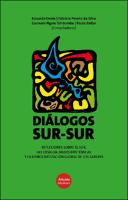Diálogos Sur-Sur
Reflexiones sobre el sur, las desigualdades epistémicas y la democratización global de los saberes
Contributor(s)
Devés, Eduardo (editor)
Pereira da Silva, Fabricio (editor)
Ngoie Tshibambe, Germain (editor)
Baltar, Paula (editor)
Language
SpanishAbstract
One of the keys to understanding global inequalities and seeking ways to overcome them is to accept and develop a theoretical assumption: the euphemistically called global “asymmetries” are not only economic or geopolitical. They are equally symbolic. This is where the debates on epistemic dependency (Beigel, 2013) and the coloniality of knowledge (2000) are located, the reflections on “epistemic violence” and “epistemicides” (Spivak, 1988, Santos, Meneses, 2009), on the subject colonial and postcolonial (Césaire, 2004, Fanon, 1966, Hall, 2015) and, in particular, on the role of the "peripheral intellectual" and the production of knowledge in the "Sures" (Devés, 2017). In fact, it is perceived that peripheral knowledge and knowledge have less legitimacy than central knowledge and are frequently not considered "science" or "theory". Their proposals do not circulate or circulate little and tend to disappear over time.
Keywords
South-South Studies; epistemic differences; periphery, Studies of ideasDOI
10.26448/ae9789566095712.56ISBN
9789566095712Publisher
Ariadna EdicionesPublisher website
https://ariadnaediciones.cl/Publication date and place
Santiago, Chile, 2022Classification
Cultural studies


 Download
Download Web Shop
Web Shop